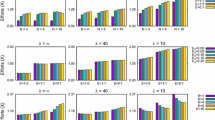Abstract
Some cooperative survival situations require all members of a group to participate equally in collective action; however, if the only sanction for non-participatory free-riding is exclusion, then it can be ineffective, as exclusion is indistinguishable from non-participation. The question then is: how does a group, that can define a set of mutually agreed conventional rules, incentivise participation that supports collective survival when the only sanctioning instrument is exclusion. This problem is investigated in this paper through the design and implementation of a self-organising multi-agent simulator for an iterated cooperative survival game. A series of experiments, or ‘survival trials’, is run for three different sanctioning schemes: fixed-length, dynamic-length and graduated-length exclusion. Results show that graduated sanctions outperform the alternatives, which can be either too weak or too strong. We conclude by arguing that these results provide evidence for why graduated sanctions are the basis for one of the principles of self-governing institutions.
Access this chapter
Tax calculation will be finalised at checkout
Purchases are for personal use only
Similar content being viewed by others
References
Artikis, A., Sergot, M., Pitt, J.: Specifying norm-governed computational societies. ACM Trans. Comput. Logic 10(1) (2009). https://doi.org/10.1145/1459010.1459011
Balke, T., De Vos, M., Padget, J.: I-abm: combining institutional frameworks and agent-based modelling for the design of enforcement policies. Artif. Intell. Law 21(4), 371–398 (2013). https://doi.org/10.1007/s10506-013-9143-1
Brennan, G., Pettit, P.: The Economy of Esteem: An Essay on Civil and Political Society. Oxford University Press, Oxford (2004). https://doi.org/10.1093/0199246483.001.0001
Cialdini, R.: Influence: The Psychology of Persuasion. William Morrow e Company, New York, NY (1984)
Condorcet, N.d.: Essay sur l’Application de l’Analyse á la Probabilité des Décisions Rendue à la Pluralité des Voix. Paris (1785)
Davoust, A., Rovatsos, M.: Social contracts for non-cooperative games. In: Proceedings of the AAAI/ACM Conference on AI, Ethics, and Society, pp. 43–49. AIES ’20, Association for Computing Machinery, New York, NY, USA (2020). https://doi.org/10.1145/3375627.3375829
Fehr, E., Rockenbach, B.: Detrimental effects of sanctions on human altruism. Nature 422(6928), 137–140 (2003)
Gigerenzer, G.: How to make cognitive illusions disappear: beyond “heuristics and biases". Eur. Rev. Soc. Psychol. 2(1), 83–115 (1991). https://doi.org/10.1080/14792779143000033
Hardin, G.: The tragedy of the commons. Science 162(3859), 1243–1248 (1968). https://doi.org/10.1126/science.162.3859.1243’www.science.org/doi/abs/10.1126/science.162.3859.1243’
Hare, R.: Moral Thinking: Its Levels, Method, and Point. Oxford University Press, UK (1981). https://books.google.co.uk/books/about/Moral_Thinking.html?id=SverDwAAQBAJ &redir_esc=y
Hegel, G.W.F.: Phenomenology of Spirit. Oxford University Press, Oxford (1807)
Hemming, R., Kay, J.A.: The laffer curve. Fiscal Studies 1(2), 83–90 (1980). www.jstor.org/stable/24434417
Kurka, D.B., Pitt, J.: Disobedience as a mechanism of change. In: 12th International Conference on Self-Adaptive and Self-Organizing Systems. IEEE (2018)
List, C.: Social Choice Theory. In: Zalta, E.N., Nodelman, U. (eds.) The Stanford Encyclopedia of Philosophy. Metaphysics Research Lab, Stanford University, Winter 2022 edn. (2022)
Mill, J.: Utilitarianism. The works of John Stuart Mill, Parker, Son and Bourn (1863). https://books.google.co.uk/books?id=lyUCAAAAQAAJ
Mongin, P.: Expected utility theory. Handbook of Economic Methodology, pp. 342–350 (1997)
Nardin, L.G., Balke-Visser, T., Ajmeri, N., Kalia, A.K., Sichman, J.S., Singh, M.P.: Classifying sanctions and designing a conceptual sanctioning process model for socio-technical systems. Knowl. Eng. Rev. 31(2), 142–166 (2016). https://doi.org/10.1017/S0269888916000023
Ober, J.: Democracy and Knowledge: Innovation and Learning In Classical Athens. Princeton University Press, Princeton, NJ (2008)
Ostrom, E.: Governing the Commons: The Evolution of Institutions for Collective Action. Canto Classics. Cambridge University Press (2015). https://books.google.co.uk/books?id=hHGgCgAAQBAJ
Ostrom, E.: Common-pool resources and institutions: toward a revised theory. Handb. Agric. Econ. 2, 1315–1339 (2002)
Ostrom, E.: The challenge of common-pool resources. Environ.: Sci. Policy Sustain. Dev. 50(4), 8–21 (2008)
Perreau de Pinninck, A., Sierra, C., Schorlemmer, M.: Distributed norm enforcement: Ostracism in open multi-agent systems. In: Casanovas, P., Sartor, G., Casellas, N., Rubino, R. (eds.) Computable Models of the Law, pp. 275–290. Springer, Berlin, Heidelberg (2008). https://doi.org/10.1007/978-3-540-85569-9_18
Pitt, J.: Self-Organising Multi-Agent Systems. World Scientific, London, UK (2021)
Scott, M., Dubied, M., Pitt, J.: Social motives and social contracts in cooperative survival games. In: Coordination, Organizations, Institutions, Norms, and Ethics for Governance of Multi-Agent Systems XV: International Workshop, COINE 2022, Virtual Event, May 9, 2022, Revised Selected Papers, pp. 148–166. Springer (2022)
Acknowledgements
We are particularly grateful to the members of the SOMAS team at Imperial College London, specifically, Neel Dugar and Rasvan Rusu for developing a robust infrastructure, as well as Sacha Hakim and Michal Makowka for their contribution to the agent specification.
Author information
Authors and Affiliations
Corresponding author
Editor information
Editors and Affiliations
Rights and permissions
Copyright information
© 2023 The Author(s), under exclusive license to Springer Nature Switzerland AG
About this paper
Cite this paper
Blackledge, B. et al. (2023). Incentivising Participation with Exclusionary Sanctions (Full). In: Fornara, N., Cheriyan, J., Mertzani, A. (eds) Coordination, Organizations, Institutions, Norms, and Ethics for Governance of Multi-Agent Systems XVI. COINE 2023. Lecture Notes in Computer Science(), vol 14002. Springer, Cham. https://doi.org/10.1007/978-3-031-49133-7_3
Download citation
DOI: https://doi.org/10.1007/978-3-031-49133-7_3
Published:
Publisher Name: Springer, Cham
Print ISBN: 978-3-031-49132-0
Online ISBN: 978-3-031-49133-7
eBook Packages: Computer ScienceComputer Science (R0)




